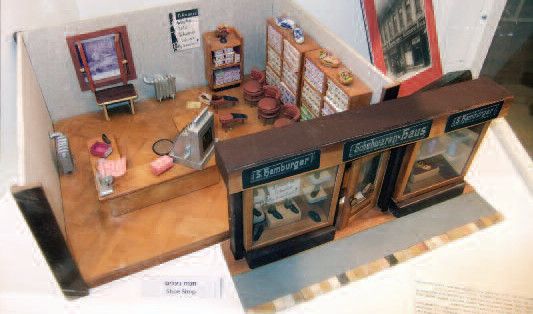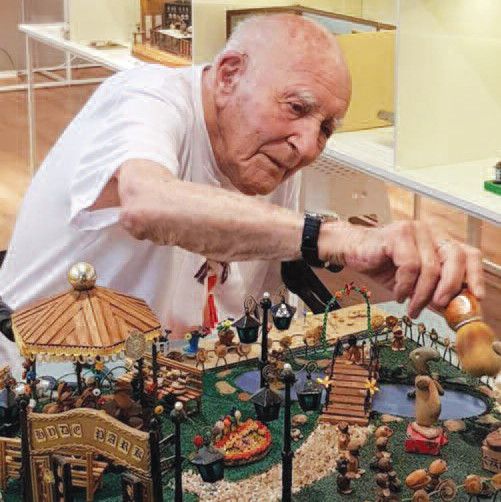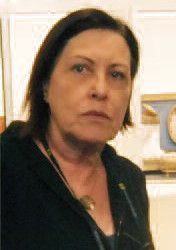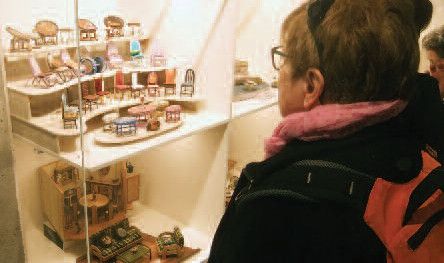It’s a Small World
Photos by Lydia Aisenberg
One would hardly expect to find a museum of miniature models slap bang in the middle of the sprawling Silicon Valley that has developed in recent years in the western Jezreel Valley town of Yokneam-
However, housed in one of the none-too-elegant glass fronted multi-storey purpose-built seats of hi-tech a short drive from Haifa, one can find The Great Mini World Museum, a collection of painstakingly created scenes of yesteryear's Jewish Europe and much more – the work of 95 year-old German born Haifa resident Moshe (Herbert) Samter.
Samter's daughters, Anat Orland, a graphic designer who also creates decorative furniture for private homes and offices and Edna Yahav, an artist working in wood and clay, opened the museum together with their brother, Uri Zamir who is also a multidisciplinary artist.
"Our father has always had an unlimited source of creative ideas," explains Anat to a visiting group of Israeli pensioners who strongly identified with many of the micro scenes from the rich Jewish cultural and religious life in pre-Holocaust Europe – where many of the visitors' parents, and some themselves, were born.
"When he retired thirty years ago, our father began to convert his dreams into reality in the form of a rich visual world of miniature models from natural materials he would gather when out walking forest tracks or along the sea shore. All over the place he would simply pick up what most people would see as junk," they explain.
An old pharmacist's shop in pre-war Germany is among some of the fascinating and captivating scenes of a disappeared world arranged in separate boxed-off long, glass-fronted show cases around the spacious museum.
Scores of tiny white porclain jars sit on the high dark wooden shelving at the back of the pharmacy, the man himself decked in his white overall, proudly standing behind a highly polished wood and brass counter top ready to serve customers seeking a cure for anything from the common cold to more serious ailments.
Peering into the pharmacy, nose almost touching the glass, this writer was suddenly overcome with long forgotten aromas from the past, literally taken back in a flash to the assortment of oils, ointments and creams that always seemed to be available on the shelf of grandma's pantry cum mini-chemist and first aid station in 1950's Britain.
A replica of the shoe store where Moshe Samter's father worked in Germany, leather shoes, leather covered stools for customers to sit comfortably whilst trying on eagerly sought bargains, shoe boxes stacked to the ceiling, comes alive while I was reading a note penned by the artist creator of yore. In English and Hebrew, at the side of the exhibit, one reads:
"This is a replica of the shoe store, run by my father Julius Josef Samter, in Reichenbach, Germany. Our apartment was on the second floor, right above the store and I used to play in the backyard behind."
If one looks close enough at the postcard size photo sitting on an easel alongside the mini replica, Moshe can actually be seen peering down at the people in the street below through one of the second floor apartments front windows!
"In 1935 the store was sold and my father remained unemployed. He tried to obtain a license to open his own shoe store, but was refused because he was Jewish. The situation of the Jewish people in Germany worsened and my father decided it was better to leave for Israel and so in September, 1936, when I was 13-years-old, we immigrated to Israel and settled in Haifa," it reads.
"Our father has created over 100 different works in the last 30 years and still today he continues to create more tiny pieces that make up the mini-scene he is presently working on – a small space set aside for a workshop in the home for elderly citizens where he is now a much revered resident," the visitors to the mini world of Moshe Samter are told by his very proud daughters.
Apart from scenes inside Eastern European synagogues and Hassidic folk going about their daily business in the shtetl, culture is celebrated in Moshe Samter's mini-world in the form of tiny antique furniture arranged in a library or reading room of an obviously wealthy family and also musical instruments the likes of pianos, violins and guitars on instrument stands.
For veteran Israelis looking in through the looking glass at the world of Moshe Samter, recognition of not only the scenes, characters and places he portrays in his mini-world comes together with recognition of some of the materials he has used that would probably have been seen as 'junk' wherever they had been discarded and scooped up by a delighted Moshe.
Travellers on Egged (Israel's public bus company) of days long gone will recognize the blue chequered pattern, as well as orange, yellow and red striped one, that in the past would have adorned Egged buses in what looks like lush carpets under miniature antique furniture in a number of the rooms he has created.
The eye for detail, the humor, sensitivity, imagination and pathos found in the work of Moshe Samter opens mini-doors to the past, kick starting one's memory box into full gear as scenes, smells and stories from the past become the talking point of the day for visitors strolling down Moshe's so enriching miniature memory lane.
The Great Mini World Museum
1 Ha-Tsmikha Street, Yokneam Illit
Phone: 054 483 4210
Price: NIS 25
Please note the openning times are updated monthly












Comments